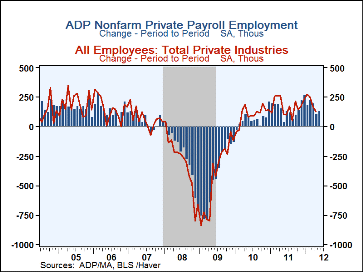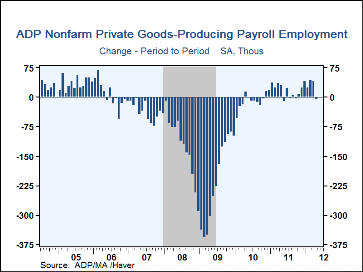 Global| May 31 2012
Global| May 31 2012ADP Reports Another Sluggish Job Gain
by:Tom Moeller
|in:Economy in Brief
Summary
While job growth improved slightly during May, this quarter's rise still is sharply reduced versus Q1. Private sector payrolls rose 133,000 as reported by the payroll processor Automatic Data Processing (ADP) and economic consultants [...]
 While job growth improved slightly during May,
this quarter's rise still is sharply reduced versus Q1.
Private sector payrolls rose 133,000 as reported by the payroll processor
Automatic Data Processing (ADP) and economic consultants Macroeconomic
Advisers. A 150,000 gain had been expected. The latest followed a 113,000
rise in April, initially reported as 119,000. The increases follow a
217,000 Q1 average which was boosted by a unseasonably warm winter
temperatures.
While job growth improved slightly during May,
this quarter's rise still is sharply reduced versus Q1.
Private sector payrolls rose 133,000 as reported by the payroll processor
Automatic Data Processing (ADP) and economic consultants Macroeconomic
Advisers. A 150,000 gain had been expected. The latest followed a 113,000
rise in April, initially reported as 119,000. The increases follow a
217,000 Q1 average which was boosted by a unseasonably warm winter
temperatures.
The U.S. Bureau of Labor Statistics will report May payroll employment tomorrow. Economists expect a 169,000 worker increase in private sector jobs. By comparison, the April increase of 113,000 in ADP's measure of private nonfarm payrolls was accompanied by a 130,000 gain in the BLS measure of private sector jobs. According to ADP and Macro-Advisers, the correlation between the monthly percentage change in the ADP figure and the BLS data is 0.90. ADP compiles its estimate from its database of individual companies' payroll information. Macroeconomic Advisers, LLC, the St. Louis economic consulting firm, developed the methodology for transforming the raw data into an economic indicator.
Payroll growth remained modest this month. Service producing payrolls rose 132,000 (1.9% y/y) following growth as high as 225,000 in December. Goods-producing payrolls ticked up just 1,000 following an April decline of 6,000 and a Q1 average gain of 37,000. Factory sector jobs fell for the second consecutive month. Overall, small-sized payrolls led last month's job growth with 67,000 (2.0% y/y) increase. Medium-sized payrolls followed with a 57,000 (1.9% y/y) increase while large payrolls rose just 9,000 (0.7% y/y). Construction employment slipped 1,000, down for the second consecutive month but the number of financial activities jobs rose 8,000.
The ADP National Employment Report data is maintained in Haver's USECON database; historical figures date back to December 2000. The figures in this report cover only private sector jobs and exclude employment in the public sector. The ADP methodology is explained here. The expectations figures are available in Haver's AS1REPNA database.
Subdued Business Lending from the Federal Reserve Bank of Cleveland can be found here.
| ADP National Employment Report | May | Apr | Mar | Y/Y | 2011 | 2010 | 2009 |
|---|---|---|---|---|---|---|---|
| Nonfarm Private Payroll Employment (m/m Chg., 000s) | 133 | 113 | 200 | 1.8% | 1.4% | -1.0% | -4.1% |
| Small Payroll (1-49) | 67 | 57 | 93 | 2.0 | 1.4 | -0.9 | -4.1 |
| Medium Payroll (50-499) | 57 | 52 | 85 | 1.9 | 1.8 | -0.9 | -5.7 |
| Large Payroll (>500) | 9 | 4 | 22 | 0.7 | 0.4 | -1.8 | -5.6 |
| Goods Producing | 1 | -6 | 42 | 1.2 | 0.8 | -4.8 | -12.4 |
| Manufacturing | -2 | -6 | 21 | 0.7 | 1.3 | -3.2 | -11.4 |
| Service Producing | 132 | 119 | 158 | 1.9 | 1.5 | -0.2 | -3.2 |
Tom Moeller
AuthorMore in Author Profile »Prior to joining Haver Analytics in 2000, Mr. Moeller worked as the Economist at Chancellor Capital Management from 1985 to 1999. There, he developed comprehensive economic forecasts and interpreted economic data for equity and fixed income portfolio managers. Also at Chancellor, Mr. Moeller worked as an equity analyst and was responsible for researching and rating companies in the economically sensitive automobile and housing industries for investment in Chancellor’s equity portfolio. Prior to joining Chancellor, Mr. Moeller was an Economist at Citibank from 1979 to 1984. He also analyzed pricing behavior in the metals industry for the Council on Wage and Price Stability in Washington, D.C. In 1999, Mr. Moeller received the award for most accurate forecast from the Forecasters' Club of New York. From 1990 to 1992 he was President of the New York Association for Business Economists. Mr. Moeller earned an M.B.A. in Finance from Fordham University, where he graduated in 1987. He holds a Bachelor of Arts in Economics from George Washington University.
More Economy in Brief
 Global| Feb 05 2026
Global| Feb 05 2026Charts of the Week: Balanced Policy, Resilient Data and AI Narratives
by:Andrew Cates








